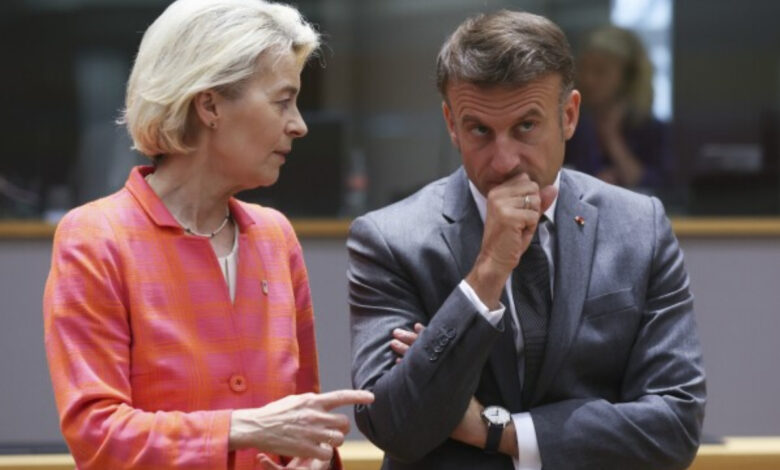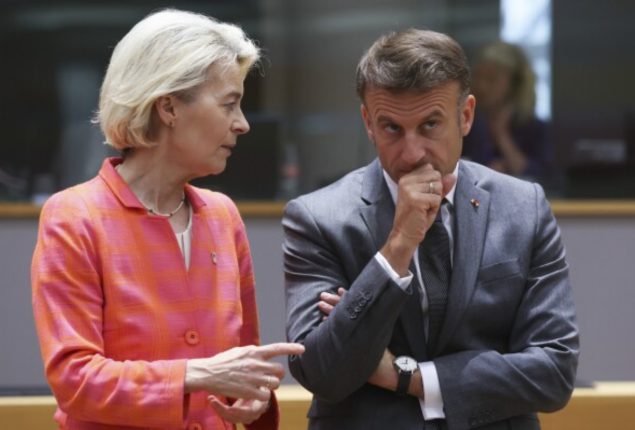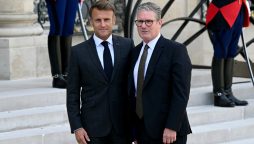Macron takes bold steps to break France’s PM deadlock


Macron takes bold steps to break France’s PM deadlock
- French President Emmanuel Macron is attempting to find a new prime minister.
- Macron has hosted two former presidents and two potential candidates to resolve the political impasse.
- The country has been without a permanent government since the July 7 legislative elections.
On Monday, French President Emmanuel Macron intensified his efforts to find a new prime minister, nearly two months after inconclusive legislative elections left the country in deadlock. Macron hosted two former presidents and two potential candidates as part of his push to resolve the political impasse.
Since the July 7 legislative elections, France has been without a permanent government. The results created a hung parliament, with the left forming the largest faction, while Macron’s centrists and the far right emerged as the other major groups.
To the anger of the left, Macron has refused to accept a nomination for a left-wing premier, arguing that such a figure would likely fail a confidence vote in parliament. Instead, the president, who has less than three years remaining in office, has let the situation drag on while the Olympics and Paralympics took place, frustrating his opponents further.
Amid signs of a shift as France returns from holidays, Macron hosted Bernard Cazeneuve, a former leading Socialist who led the government during the final months of François Hollande’s presidency, early Monday, according to an AFP journalist. Commentators view Cazeneuve as the most likely candidate for Macron’s nomination, but his appointment is still far from certain.
His appointment is “a possibility but it is not a certainty… an option but we must look closely,” a source close to Macron told the news, asking not to be named.
Cazeneuve, 61, served as interior minister for years, including during the traumatic 2015 Paris attacks, and commands respect from across the political spectrum. National Assembly Speaker Yael Braun-Pivet, a Macron supporter, told France Inter on Sunday that Cazeneuve “seems capable of uniting people beyond his own camp.”
But the hard-left France Unbowed (LFI) was unimpressed. “I don’t give him a chance. He belongs to the old world,” said the head of its MPs Mathilde Panot.
On Monday, Macron was set to host his two surviving predecessors, right-winger Nicolas Sarkozy and François Hollande, for talks at the Élysée. It is customary for the French president to consult former presidents during significant national events. Left-wing daily *Libération* speculated, “Could there soon be white smoke?” referring to the signal given when a new pope is elected.
Amid the ongoing uncertainty, Macron was also scheduled to meet with Xavier Bertrand, the right-wing head of the northern Hauts-de-France region and a former minister, later in the afternoon.
At 59, Bertrand would be a more acceptable choice for the right as prime minister. Sarkozy, despite facing multiple graft convictions after leaving office—charges he denies—remains an influential figure on the right and within Macron’s circle. He has already expressed his preference for Bertrand.
“The centre of gravity of French politics is on the right”, he argued in the Figaro daily on Saturday.
He called Bertrand a “good choice” while opposing Cazeneuve’s nomination. For a president who entered office in 2017 promising radical change in how France is governed, appointing a former prime minister from a previous administration could be perceived as a setback.
“For Emmanuel Macron, appointing Bernard Cazeneuve to the office of prime minister would implicitly acknowledge the fact that the ‘new world’ has failed,” the Le Monde daily wrote in an editorial.
Whoever is appointed will face the delicate task of negotiating legislation in a highly polarized National Assembly amid immense challenges. A looming October 1 deadline requires a new government to submit a draft budget law for 2025—something the current caretaker administration under Gabriel Attal, which has been in place since July, cannot manage.
With debts reaching 110 percent of annual output, France experienced a credit rating downgrade from Standard & Poor’s in June and received a reprimand from the European Commission for excessive deficits this year.
Source link
